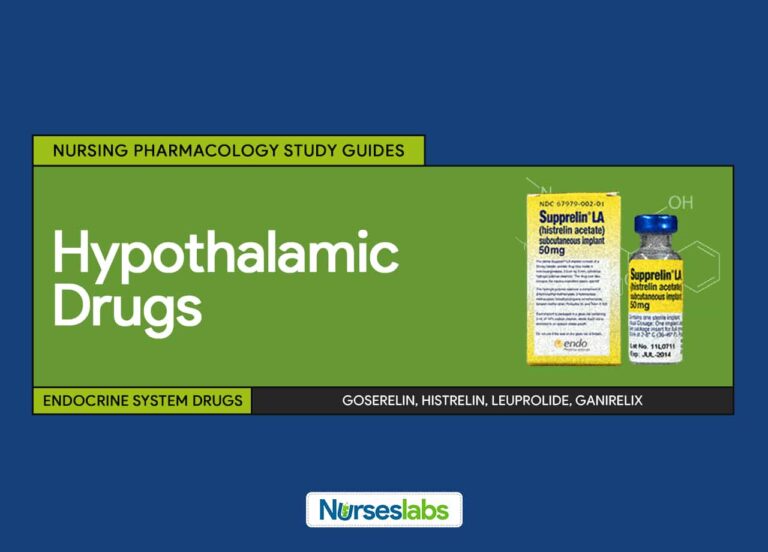Hypothalamic agents can inhibit or stimulate the release of hormones from the anterior pituitary using hormones or factors. However, not all of these hormones are available for pharmacological use.
Stimulating factors (agonists) include growth hormone-releasing hormone (GHRH), thyrotropin-releasing hormone (TRH), gonadotropin-releasing hormone (GnRH), corticotropin-releasing hormone (CRH), and prolactin-releasing hormone (PRH).
Factors that inhibit (antagonists) include somatostatin (growth hormone-inhibiting factor) and prolactin-inhibiting factor.
Other drugs acting on the endocrine system include the following: pituitary agents, adrenocortical agents, thyroid and parathyroid agents, and agents to control blood glucose levels.
Table of Contents
- Hypothalamic Agents: Generic and Brand Names
- Therapeutic Action
- Indications
- Pharmacokinetics
- Contraindications and Cautions
- Adverse Effects
- Interactions
- Nursing Considerations
- Practice Quiz: Hypothalamic Agents
- Recommended Resources
- See Also
- References and Sources
Hypothalamic Agents: Generic and Brand Names
Here is a table of commonly encountered endocrine system drugs, their generic names, and brand names:
- Stimulating factors (agonists)
- goserelin (Zoladex)
- histrelin (Vantas)
- leuprolide (Lupron)
- nafarelin (Synarel)
- tesamorelin (Egrifta)
- Inhibiting factors (antagonists)
- degarelix (Firmagon)
- genirelix (Antagon)
Therapeutic Action
The desired and beneficial action of hypothalamic agents is:
- Not clearly identified as there are only minute quantities found.
- Not all of them are used as pharmacological agents. Some are used for diagnostic purposes only and others are primarily used as antineoplastic agents.
- Tesamorelin is used to stimulate GH and its lipolytic effects, helping to decrease the excess abdominal fat in HIV-infected patients with lipodystrophy.
Indications
Hypothalamic agents are indicated for the following medical conditions:
- Hypothalamic hormones are not all available for pharmacological use; those that are available are used mostly for diagnostic testing, for treating some forms of cancer, or as adjuncts in fertility programs.
- Agonists like goserelin, histrelin, leuprolide, and nafarelin are analogues of GnRH. They decrease production of sex hormones. They are used as treatment for precocious puberty, endometriosis, and advanced prostate cancer.
- Antagonists of GnRH like degarelix and ganirelix are used as treatment for advanced prostate cancer and inhibition of premature LH surge in women undergoing controlled ovarian stimulation for fertility.
Here are some important aspects to remember for indication of hypothalamic agents in different age groups:
Children
- Monitor closely for adverse effects associated with changes in overall endocrine function, particularly growth and development and metabolism.
- Standard part of treatment plan should include periodic radiograph of long bones and monitoring of blood sugar and electrolytes.
Adults
- Monitor blood sugar and electrolytes.
- Review proper administration of nasal forms of drugs for diabetes insipidus to prevent complications.
- Review proper storage, preparation, and administration of regular injections.
- Drugs should not be used among pregnant and lactating women unless benefits clearly outweigh the risks.
Older adults
- Evaluate hydration, nutrition, and electrolyte balance periodically.
- Review proper administration technique because they are at high risk for dehydrated membranes and ulcerations.
Pharmacokinetics
Here are the characteristic interactions of hypothalamic agents and the body in terms of absorption, distribution, metabolism, and excretion:
| Route | Onset | Peak | Duration |
| IM depot | 4 h | Variable | 1,2,3, or 4 mo |
| T1/2: 3 h Metabolism: unknown Excretion: unknown |
Contraindications and Cautions
The following are contraindications and cautions for the use of hypothalamic agents:
- Allergy to any component of the drug. To prevent hypersensitivity reactions.
- Peripheral vascular disorders. Can alter absorption of drugs.
- Rhinitis. Alters absorption of nafarelin nasal spray.
- Renal or hepatic impairment. Interfere with drug metabolism and excretion.
- Pregnancy or lactation. Potential adverse effects to fetus or neonates.
Adverse Effects
Use of hypothalamic agents may result to these adverse effects:
- Agonists: increased release of sex hormones, ovarian overstimulation, flushing, increased temperature and appetite, fluid retention
- Antagonists: decreased testosterone level, loss of energy, decreased sperm count and activity, alterations in secondary sex characteristics (decrease in female sex hormones, amenorrhea), fluid and electrolyte changes, insomnia, irritability
Interactions
Drug interactions of hypothalamic agents are related to the specific hormones that the drug is affecting. They will be discussed in detail as each agents for specific hormones will be covered in this study guide.
Nursing Considerations
The specific nursing care of patient who is receiving hypothalamic releasing factor is related to the hormone(s) that the drug is affecting. This will be discussed further as each drugs affecting certain hormones will be covered in this study guide.
Practice Quiz: Hypothalamic Agents
Here are some practice questions for this study guide. Please visit our nursing test bank page for more NCLEX practice questions.
1. All of these drugs can decrease the production of sex hormones, except:
A. goserelin
B. histrelin
C. degarelix
D. tesamorelin
1. Answer: C. degarelix
Options A, B, and D are all hypothalamic agonists and can, therefore, decrease the production of sex hormones. Agonists inhibit pituitary gonadotropin secretion, with a resultant drop in the production of sex hormones.
2. Which of the following health history data will alert the nurse to question the use of hypothalamic agents in a short-term therapy?
A. history of hepatic lobe transplant three years ago
B. a mother who practices mixed feeding to her newborn baby
C. a chest x-ray suggestive of pneumonia
D. fever probably caused by post-surgical wound infection
2. Answer: B. a mother who practices mixed feeding to her newborn baby
Hypothalamic agents should be cautioned in lactating mothers because of potential adverse effects to the neonate. All other options are not contraindicated.
3. Knowing hypothalamic agonists’ effect to the sex hormones, which of the following medical conditions can they be used?
A. infertility
B. endometriosis
C. precocious puberty
D. Both B and C
3. Answer: D. Both B and C
Agonists can decrease the production of sex hormones. Medical conditions like endometriosis and precocious puberty are characterized by increased sex hormones. Infertility will best benefit from hypothalamic antagonists.
4. This drug decreases the abdominal fat in HIV-infected patients with lipodystrophy.
A. tesamorelin
B. histrelin
C. leuprolide
D. nafarelin
4. Answer: A. tesamorelin
It does this through stimulating the lipolytic effect of growth hormones.
5. Which of the following should be monitored closely in patients receiving hypothalamic agents?
A. serum sodium and potassium levels
B. blood sugar level
C. all of the above
D. none of the above
5. Answer: C. all of the above
In patients receiving hypothalamic agents, the nurse should monitor closely for adverse effects associated with changes in overall endocrine function, particularly growth and development and metabolism. Other aspects to be monitored include periodic radiograph of long bones, hydration, and nutrition.
Recommended Resources
Our recommended nursing pharmacology resources and books:
Disclosure: Included below are affiliate links from Amazon at no additional cost from you. We may earn a small commission from your purchase which will help support us. Thank you! For more information, check out our privacy policy.
Pharm Phlash! Pharmacology Flash Cards #1 BEST SELLER!
Test-yourself review cards put critical clinical information for nearly 400 of the top generic medications at your fingertips. And, you can count on them for accuracy, because each card is based on content from Davis’s Drug Guide for Nurses. Increase your test scores in pharmacology class.
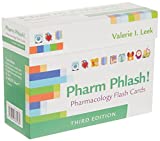
Focus on Pharmacology (8th Edition)
Focus on Nursing Pharmacology makes challenging concepts more approachable. Engaging learning features cultivate your clinical application, critical thinking and patient education capabilities. This updated 8th edition builds on your knowledge of physiology, chemistry and nursing fundamentals to help you conceptualize need-to-know information about each group of drugs.
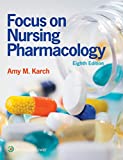
Pharmacology Made Incredibly Easy (Incredibly Easy! Series®)
Nursing pharmacology guide offers step-by-step guidance so you can grasp the fundamentals in enjoyable Incredibly Easy style. This is the perfect supplement to class materials, offering solid preparation for NCLEX® as well as a handy refresher for experienced nurses. Colorfully illustrated chapters offer clear, concise descriptions of crucial nursing pharmacology concepts and procedures.
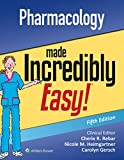
Lehne’s Pharmacology for Nursing Care (11th Edition)
The Eleventh Edition of Lehne’s Pharmacology for Nursing Care provides a thorough understanding of key drugs and their implications for nursing care. This text, written by renowned nursing educators, helps you comprehend and apply pharmacology principles. A clear and engaging writing style simplifies complex concepts, making even the most challenging pharmacology content enjoyable. We recommend this book if you want a comprehensive nursing pharmacology guide.
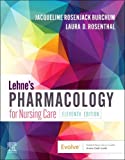
Nursing Drug Handbook
Nursing2023 Drug Handbook delivers evidence-based, nursing-focused drug monographs for nearly 3700 generic, brand-name, and combination drugs. With a tabbed, alphabetical organization and a “New Drugs” section, NDH2023 makes it easy to check drug facts on the spot.
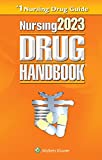
Pharmacology and the Nursing Process
The 10th edition of Pharmacology and the Nursing Process offers practical, user-friendly pharmacology information. The photo atlas contains over 100 unique illustrations and photographs depicting drug administration techniques. Updated drug content reflects the most recent FDA drug approvals, withdrawals, and therapeutic uses.
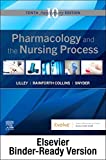
Mosby’s Pharmacology Memory NoteCards: Visual, Mnemonic, and Memory Aids for Nurses
The 6th edition of Mosby’s Pharmacology Memory NoteCards: Visual, Mnemonic, & Memory Aids for Nurses incorporates illustrations and humor to make studying easier and more enjoyable. This unique pharmacology review can be utilized as a spiral-bound notebook or as individual flashcards, making it ideal for mobile study.
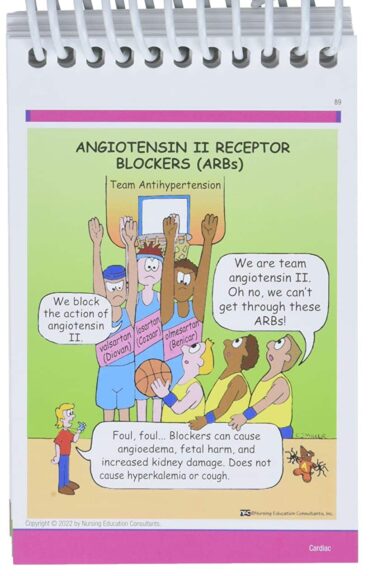
See Also
Here are other nursing pharmacology study guides:
- Nursing Pharmacology – Study Guide for Nurses
Our collection of topics related to nursing pharmacology - Pharmacology Nursing Mnemonics & Tips
These nursing mnemonics aim to simplify the concepts of pharmacology through the use of a simple, concise guide. - Generic Drug Name Stems Cheat Sheet
Learn about these generic drug name stems to help you make sense of drugs easier! - Common Drugs and Their Antidotes
A guide to drug antidotes that nurses should be familiar about. - IV Fluids and Solutions Guide & Cheat Sheet
Get to know the different types of intravenous solutions or IV fluids in this guide and cheat sheet. - Drug Dosage Calculations NCLEX Practice Questions (100+ Items)
Care to take the challenge? This quiz aims to help students and registered nurses alike grasp and master the concepts of medication calculation.
Drug Guides NEW!
Individual drug guides and nursing considerations for the most common medications used in nursing pharmacology:
- Acetaminophen (Tylenol)
- Aspirin
- Atorvastatin (Lipitor)
- Enoxaparin (Lovenox)
- Furosemide (Lasix)
- Gabapentin
- Hydromorphone (Dilaudid)
- Lisinopril
- Metoprolol
- Morphine
Gastrointestinal System Drugs
Respiratory System Drugs
- Antihistamines
- Bronchodilators and Antiasthmatics
- Decongestants
- Expectorants and Mucolytics
- Inhaled Steroids
- Lung Surfactants
Endocrine System Drugs
- Adrenocortical Agents
- Antidiabetic Agents
- Glucose-Elevating Agents
- Hypothalamic Agents
- Insulin
- Parathyroid Agents: Bisphosphonates, Calcitonins
- Pituitary Drugs
- Sulfonylureas
- Thyroid Agents
Autonomic Nervous System Drugs
- Adrenergic Agonists (Sympathomimetics)
- Adrenergic Antagonists (Sympatholytics)
- Anticholinergics (Parasympatholytics)
- Cholinergic Agonists (Parasympathomimetics)
Immune System Drugs
Chemotherapeutic Agents
- Anthelmintics
- Anti-Infective Drugs
- Antibiotics
- Antifungals
- Antineoplastic Agents
- Antiprotozoal Drugs
- Antiviral Drugs
Reproductive System Drugs
Nervous System Drugs
- Antidepressants
- Antiparkinsonism Drugs
- Antiseizure Drugs
- Anxiolytics and Hypnotic Drugs
- General and Local Anesthetics
- Muscle Relaxants
- Narcotics, Narcotic Agonists, and Antimigraine Agents
- Neuromuscular Junction Blocking Agents
- Psychotherapeutic Drugs
Cardiovascular System Drugs
References and Sources
References and sources for this pharmacology guide for Hypothalamic Agents:
- Karch, A. M., & Karch. (2011). Focus on nursing pharmacology. Wolters Kluwer Health/Lippincott Williams & Wilkins. [Link]
- Katzung, B. G. (2017). Basic and clinical pharmacology. McGraw-Hill Education.
- Lehne, R. A., Moore, L. A., Crosby, L. J., & Hamilton, D. B. (2004). Pharmacology for nursing care.
- Smeltzer, S. C., & Bare, B. G. (1992). Brunner & Suddarth’s textbook of medical-surgical nursing. Philadelphia: JB Lippincott.
